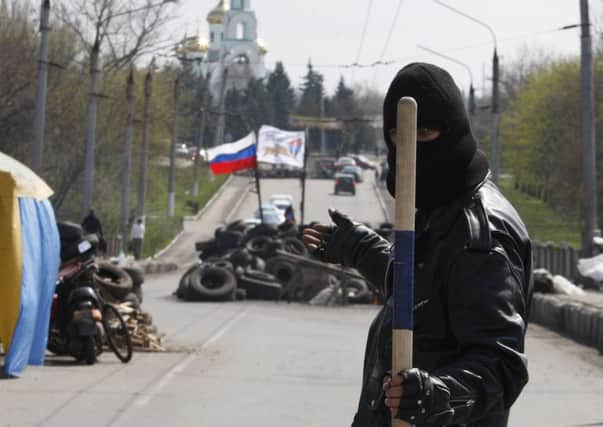Leaders: Ukraine crisis | Nigel Farage


Western governments, having had a hand through the EU’s negotiations over a trade deal which was the catalyst for the upheaval, need to learn a lesson from that and tread extremely carefully.
The most plausible analysis of events is that Vladimir Putin, the Russian president, having successfully shorn Ukraine of Crimea, is now bent on doing the same to the eastern parts where there are large numbers of Russian speakers and people keen on strong links with Mother Russia.
Advertisement
Hide AdAdvertisement
Hide AdIt also seems likely, despite Russian denials, that its agents led the storming of police stations and government offices, melting away as pro-Russian gunmen followed them in. Even if that is not the case, it is clear that armed gangs opposed to the Ukrainian government in Kiev are now in charge of these buildings.
Quite obviously, this is a terrifying crisis for Olexander Turchynov, the interim Ukrainian president. If he carries through with his threat to use the country’s armed forces to evict them, it gives Mr Putin an excuse to send in his Russian forces under the pretext of protecting pro-Russian civilians.
The parallel with Crimea is not exact because there, getting on for a majority of Crimeans were Russian citizens, which is very far from the case in eastern Ukraine. Mr Putin, however, may regard this as a mere bureaucratic detail to be ignored in a bigger cause.
Neither is this a crisis in which the use of UN peacekeepers would be appropriate, as Mr Turchynov has suggested. Quite apart from this being almost certain to be vetoed in the UN security council by Mr Putin, the function of UN troops in such situations is to keep the peace, not to storm buildings in firefights.
It would also be a clear signal that Kiev has lost control of the eastern part of the country, leading to demands for constitutional change that would very likely continue the dismemberment of Ukraine, handing victory to Mr Putin and his minority of gun-toting supporters amongst the eastern Ukrainians.
This suggests that Mr Turchynov is either being Machiavellian or mistaken in suggesting a referendum on federalism. Conducted on a nationwide basis, western Ukrainian votes against federalism could outweigh what may be legitimate demands for civic protection for the rights of Russian-speakers, deepening the crisis rather than resolving it.
Mr Turchynov needs to concentrate on containing the crisis while working on political reforms which offer genuine safeguarding status for minorities, including Russian-speakers. And western powers should support that by greatly increasing the economic pressure on Mr Putin by a significant tightening of sanctions.
Farage worthy of cold shoulder
Fresh from his televised debate successes against Nick Clegg, the deputy prime minister, Nigel Farage, the Ukip leader, wants to take on Alex Salmond. He reckons he would win an argument that Scotland’s First Minister is not offering proper independence because he wants Scotland to be part of the EU which, according to Mr Farage, is subservience.
Advertisement
Hide AdAdvertisement
Hide AdHe would like this to happen during next month’s European elections, but if not then, before September’s independence referendum. Scotland’s voters, he says, should have all the facts.
Leaving aside the issue of whether Mr Farage’s facts might actually be fiction, it is very doubtful that many Scots are as exercised about the EU as he is.
It is true that there have been recent opinion polls which suggest that as many as 40 per cent would like to leave the EU.
But opinion polling also suggests that EU membership is nowhere near the top of popular concerns, which indicates that any desire to quit the EU does not burn brightly in Scottish hearts.
That view is backed up by election results. Supporting EU membership does not seem to do the SNP any harm; being against it brings scant reward to Ukip.
Mr Farage knows this perfectly well. His debate call is patently a wheeze to give him lots of free airtime which the support for his party does not merit and which would be unfair to the other parties. The SNP is right to ignore it.
If Mr Farage is right that there is some unsuspected ferment about the EU bubbling away beneath the public concern radar, then he should be able to demonstrate it via the usual democratic campaigning in the European elections. But that would seem unlikely.